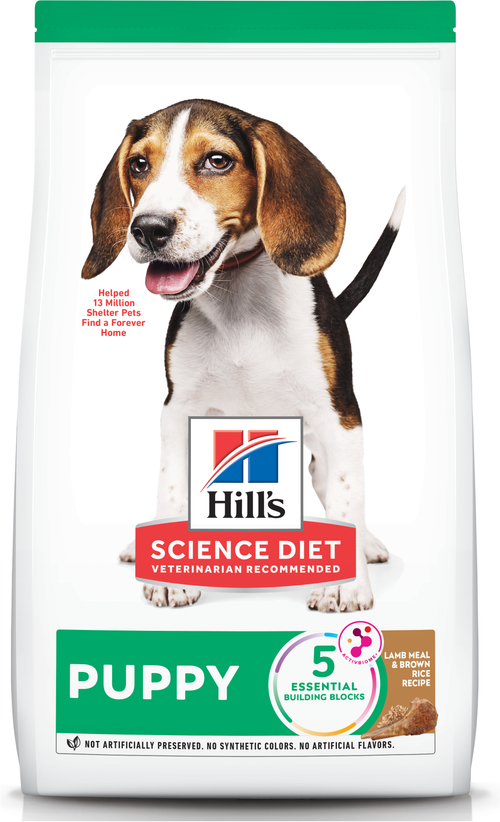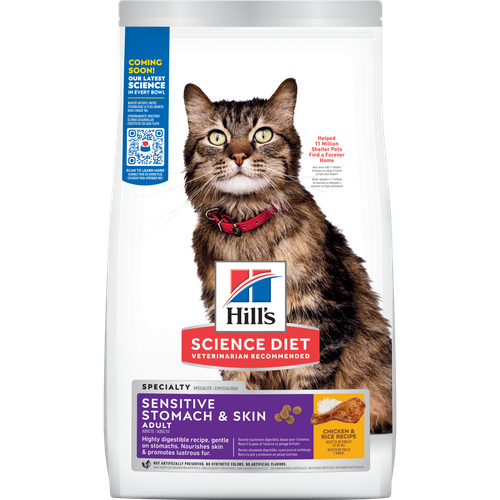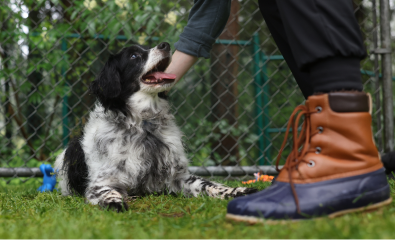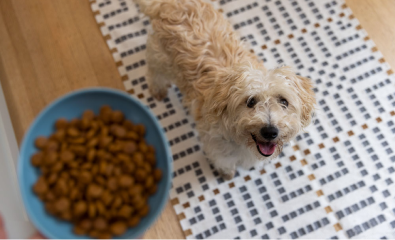
-
Find the right food for your petTake this quiz to see which food may be the best for your furry friend.Find the right food for your petTake this quiz to see which food may be the best for your furry friend.Featured products
 Puppy Large Breed Chicken & Brown Rice Recipe
Puppy Large Breed Chicken & Brown Rice RecipeVital nutrients to support 5 essential building blocks for lifelong health
Shop Now Hill's Science Diet Adult 7+ Senior Vitality Small & Mini Chicken & Rice Recipe Dog Food
Hill's Science Diet Adult 7+ Senior Vitality Small & Mini Chicken & Rice Recipe Dog FoodImproves everyday ability to get up & go
Shop Now Puppy Lamb Meal & Brown Rice Recipe
Puppy Lamb Meal & Brown Rice RecipeVital nutrients to support 5 essential building blocks for lifelong health
Shop NowFeatured products Adult Indoor Chicken Recipe Cat Food
Adult Indoor Chicken Recipe Cat FoodSupports energy level and beautiful fur in indoor cats
Shop Now Adult Sensitive Stomach & Skin Cat Food
Adult Sensitive Stomach & Skin Cat FoodHighly digestible food that is gentle on the stomach. Nourishes skin & promotes lustrous fur.
Shop Now Adult 7+ Chicken Recipe Cat Food
Adult 7+ Chicken Recipe Cat FoodSupports energy level and beautiful fur in mature cats
Shop Now -
Dog
- Dog Tips & Articles
-
Health Category
- Weight
- Food & Environmental Sensitivities
- Urinary
- Digestive
- Joint
- Kidney
-
Life Stage
- Puppy Nutrition
- Adult Nutrition
Cat- Cat Tips & Articles
-
Health Category
- Weight
- Skin & Food Sensitivities
- Urinary
- Digestive
- Kidney
-
Life Stage
- Adult Nutrition
Featured articles Water
WaterDiscover why water is the most important nutrient for your dog or cat to live a healthy life. Find out how much water your pet should consume each day.
Read More The Incredible Science Behind Your Pet's Microbiome
The Incredible Science Behind Your Pet's MicrobiomeLearn what a pet's microbiome is, how it contributes to your pet's gut & overall health, and why nutrition is important in maintaining healthy microbiomes.
Read More Pet Food Storage Tips
Pet Food Storage TipsDiscover how and where to store your dry, as well as canned, dog and cat food. Learn how to find the "best before" dates on all Hill's pet food packaging.
Read More -
Digestive health for dogs
Digestive health for dogs
What are dog digestive issues?
A digestive disorder is any health situation that prevents your dog from properly digesting food or alters the rate that food passes through their digestive tract. Don’t ignore the signs! If your furry friend is showing symptoms of digestive disorders, seek immediate advice from your veterinarian.

Know the signs of distress
Some signs of your dog’s digestive problems are easy (and unpleasant) to spot. Make sure you consult with your vet if your dog shows any of these signs:








Know the signs of distress
Some signs of your dog’s digestive problems are easy (and unpleasant) to spot. Make sure you consult with your vet if your dog shows any of these signs:








What causes dog digestive problems?
Digestive upsets can happen for a variety of reasons, and all of them can make your dog feel under the weather. Here are some of the more common causes of digestive problems in dogs.


This is the most common cause of an ‘upset stomach’ in dogs. It usually consists of vomiting and diarrhea that begins suddenly but can just be diarrhea too. It can be caused by lots of things like eating something unsavoury (we all know our dogs love doing this!), parasites, viruses and foreign bodies, to name but a few.
Unlike the sudden onset upset we just mentioned, chronic enteropathies are slower to appear and tend to last a long time. Diarrhea and weight loss are common signs. Again, it can be caused by many different things such as adverse food reactions and genetics.
The colon is part of the large bowel and when this gets inflamed it’s called colitis. It’s usually very characteristic and most dogs show the same signs - looking like they urgently need to have a poop, they might strain to have a poop but not much comes out, and one of the classic signs of colitis is fresh blood and/or slimy mucus in the stools.
This is a serious condition in dogs and can be life-threatening. Common signs of pancreatitis are sudden onset vomiting, depression and lack of appetite. It’s also a very painful condition so your dog may be restless and adopt the ‘play bow’ position to try to ease the pain. If you have any concerns that your dog might have pancreatitis get them to the vet as soon as you can.
This complicated-sounding name describes a condition where dogs are lacking certain enzymes needed for digestion. The pancreas produces some of these and when they are lacking the food passes straight through without the dog being able to get at the nutrients. Dogs with EPI tend to be ravenously hungry but still lose weight and look in poor condition. Because they don’t digest fat well, their stools may be greyish in colour. Some breeds such as German shepherds are more prone to it than others. Usually supplementing the diet with the missing enzymes gives a good result.
Dogs can react badly to certain foods for a number of reasons and together we call these adverse food reactions. True food allergies are rarer than people think and they tend to be caused by proteins in foods such as beef and chicken. Food allergies can cause vomiting and diarrhea and also skin issues like itchiness.
The same as in humans, when dogs are constipated, they find pooping difficult and they might go to the toilet much less frequently. Constipation can be caused by lots of things. Eating bones can make the stools hard and difficult to pass, dehydration or a sluggish bowel will also mean that the stools are dry and difficult to shift.
How can you help?
First, if you suspect your dog is suffering from a digestive disorder, talk to your vet about treatments that may be able to help. You can further help your dog by reducing the amount of stress triggers in their environment with some of these suggestions:


Stick with a routine
Dogs love predictability. Knowing they can anticipate when you’ll arrive home, when meals will appear and when it’s time for a walk will help keep your dog’s anxiety to a minimum.


Accessorize
There are a variety of products on the market intended to help calm your dog. Ask your veterinarian for a recommendation that could help address your dog’s stress response in anxiety-inducing situations.


Consider their nutrition
Foods made with highly digestible ingredients can be gentle on upset tummies. Ask your veterinarian about switching your dog’s food and how to do it without upsetting your dog’s stomach any further.
How can you help?
First, if you suspect your dog is suffering from a digestive disorder, talk to your vet about treatments that may be able to help. You can further help your dog by reducing the amount of stress triggers in their environment with some of these suggestions:


Stick with a routine
Dogs love predictability. Knowing they can anticipate when you’ll arrive home, when meals will appear and when it’s time for a walk will help keep your dog’s anxiety to a minimum.


Accessorize
There are a variety of products on the market intended to help calm your dog. Ask your veterinarian for a recommendation that could help address your dog’s stress response in anxiety-inducing situations.


Consider their nutrition
Foods made with highly digestible ingredients can be gentle on upset tummies. Ask your veterinarian about switching your dog’s food and how to do it without upsetting your dog’s stomach any further.
Related products

Clinically tested nutrition formulated for multiple benefits: digestive health, weight management, blood sugar management and urinary health

Clinically tested nutrition formulated for multiple benefits: digestive health, weight management, blood sugar management and urinary health

Supports energy level and beautiful coat in mature dogs

Hill's Science Diet Sensitive Stomach & Skin Small & Mini dry dog food is tailored nutrition for Small & Mini dogs while being gentle on stomachs. Nourishes skin & promotes a lustrous coat.
Related articles

Learn how much to feed your new puppy, how to handle a pup that's a picky eater, and whether wet or dry dog food is best for his needs.

You feed tasty and nutritious dog food, yet your dog only sniffs and licks at it. It’s time for the next meal, but the previous meal still isn’t finished. You might have a finicky dog!

Read to learn about 5 human foods that are toxic to dogs. Learn their effects on a dog's health and what to do if they accidentally eat one of these foods.

Learn how to help your puppy learn good behaviors by starting with proper table manners. Follow these helpful feeding tips.

